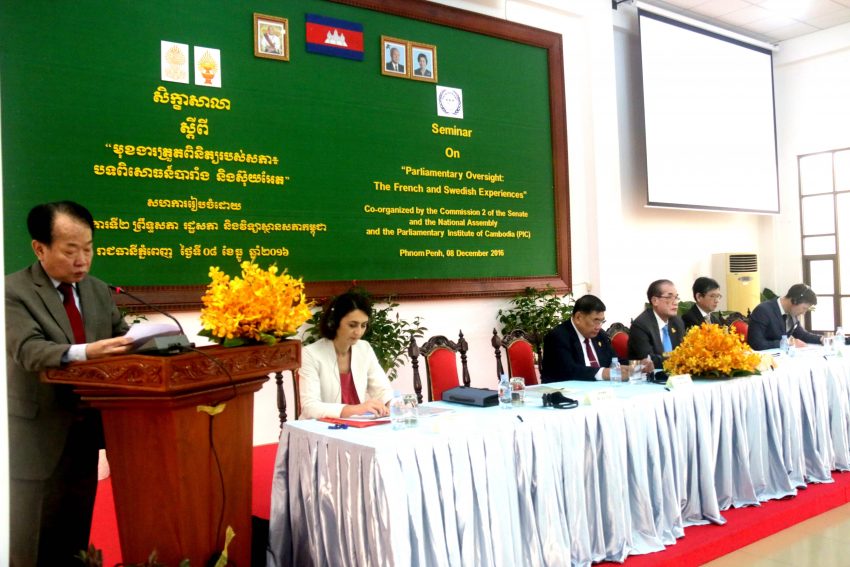A seminar entitled Parliamentary Oversight—Experiences of French and Swedish Parliaments took place on Thursday 8 December 2016 at the Conference Hall of the Senate of Cambodia. This event was organized by the Commissions 2 on Economy, Finance, Banking and Audit of the Senate and National Assembly, with support from the General Secretariat of the Senate and the Parliamentary Institute of Cambodia. The 130 participants included Members of Commissions,
Senators, Members of the National Assembly and parliamentary staff. Representatives from the Parliamentary Institute of Cambodia (PIC) and other development partners also attended. The objective of the Seminar was to present procedures of parliamentary oversight and the roles of commissions regarding this function.
In his opening speech, H.E. Cheam Yeap, Chairman of the National Assembly’s Commission 2, highlighted some constitutional and procedural aspects relating to budgetary monitoring provided for under the Law on Financial Systems. He also described the active participation of Commission 2 and other specialized Commissions of the Parliament in the cycle of budget development, adoption, implementation, monitoring and the audit of the Law on Financial Management. He emphasized the importance of parliamentary participation in the budgeting process in promoting public accountability in a democratic Parliament and its crucial role in countering corruption.
H.E.Cheam Yeap reiterated that: “In order to perform its budgetary monitoring function, Commission 2 of the National Assembly often cooperates with experts including those from the World Bank, the IMF, development partners, civil societies and other parliamentary Commissions of regional countries.”
H.E. Oum Sarith, Secretary General of the Senate, welcomed the enthusiastic participation from parliamentarians saying that this seminar represented an important initiative for the Commissions of both Houses in the key topic of parliamentary oversight. He also thanked PIC for its recently-launched three-year training program on running the Parliamentary Budget Office (PBO): this is being offered to staff of the General Secretariat of the Senate to enable them to develop the skills and knowledge to provide technical assistance to MPs in fulfilling their oversight functions through the implementation of budgetary monitoring.
After the opening session, Ms. Emmanuelle Lavie, an expert from the French National Assembly, described how Members of the French Parliament perform their oversight function, especially since the amendment of the French Constitution in 2008 that allows diverse political groups representing different aspects of French society to enjoy equitable time and space in having their voices heard by the majority in the political processes.
Following the presentation of the French oversight system, Dr Robin Travis, Head of the section for law and politics of the Research Service of the Swedish Parliament, outlined some of the basics of the Swedish political system, and instruments of oversight and control, including parliamentary budget oversight. He also focused on parliamentary budget oversight conducted through Parliamentary Budget Offices – their roles, products and links with the Cambodian context.
With particular reference to his involvement with the PBO training program for the Cambodian parliament, Dr. Travis said that: ”The objective of the program is to help parliamentary staff to understand the State Budget, fiscal discipline and good management of public finances so that they can provide support for Commissions and Parliament in discussing the government budget, and increase knowledge about budgetary procedures and compliance with budgetary rules and procedures.”
The Question and Answer session that followed these two interesting and thorough presentations gave Cambodian parliamentarians the opportunity to ask questions and to draw ideas for use in their own national context.
In his closing speech, H.E. Chea Chet, Chairman of the Senate’s Commission 2, expressed satisfaction with the dynamic participation of MPs who had shown an interest in the Seminar by raising questions for discussion and by sharing their experiences with the French and Swedish parliamentary experts on different modalities in their oversight function. H.E. Chea Chet also further clarified the functioning and the organization of the PBO training program in Cambodia, saying that he hoped parliamentary staff participating in these training activities would gain professional capabilities in providing research services and budget analysis. These would be important for the parliamentary Commissions especially in their role of budget monitoring and the examination of the Budget Law, he said.
Through the seminar, Cambodian Parliamentarians learned a great deal about organizational and functional operations and procedures, and different monitoring formulae and mechanisms. These included the legal framework for the oversight role of different political groups including the opposition and minority parties, the control mechanism in respect of the standing Commission and individual Members of the Parliament, the control function in the application of legislation and public policies, the role of the Commissions in the legislative process, and their control functions in respect of budgetary and financial affairs, and nominations for important posts.
Parliamentary oversight encompasses all the procedures and means available to parliamentarians to analyze, discuss, monitor, and support the work of the Executive. Through its fundamental function of oversight, Parliament holds the Executive to account on behalf of the people.

